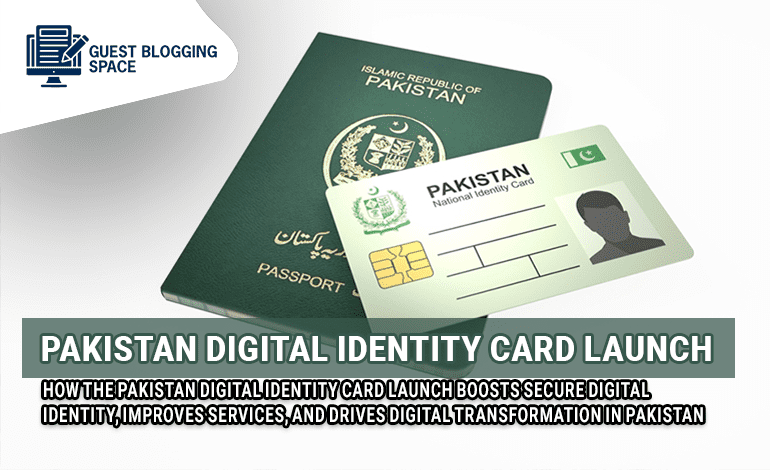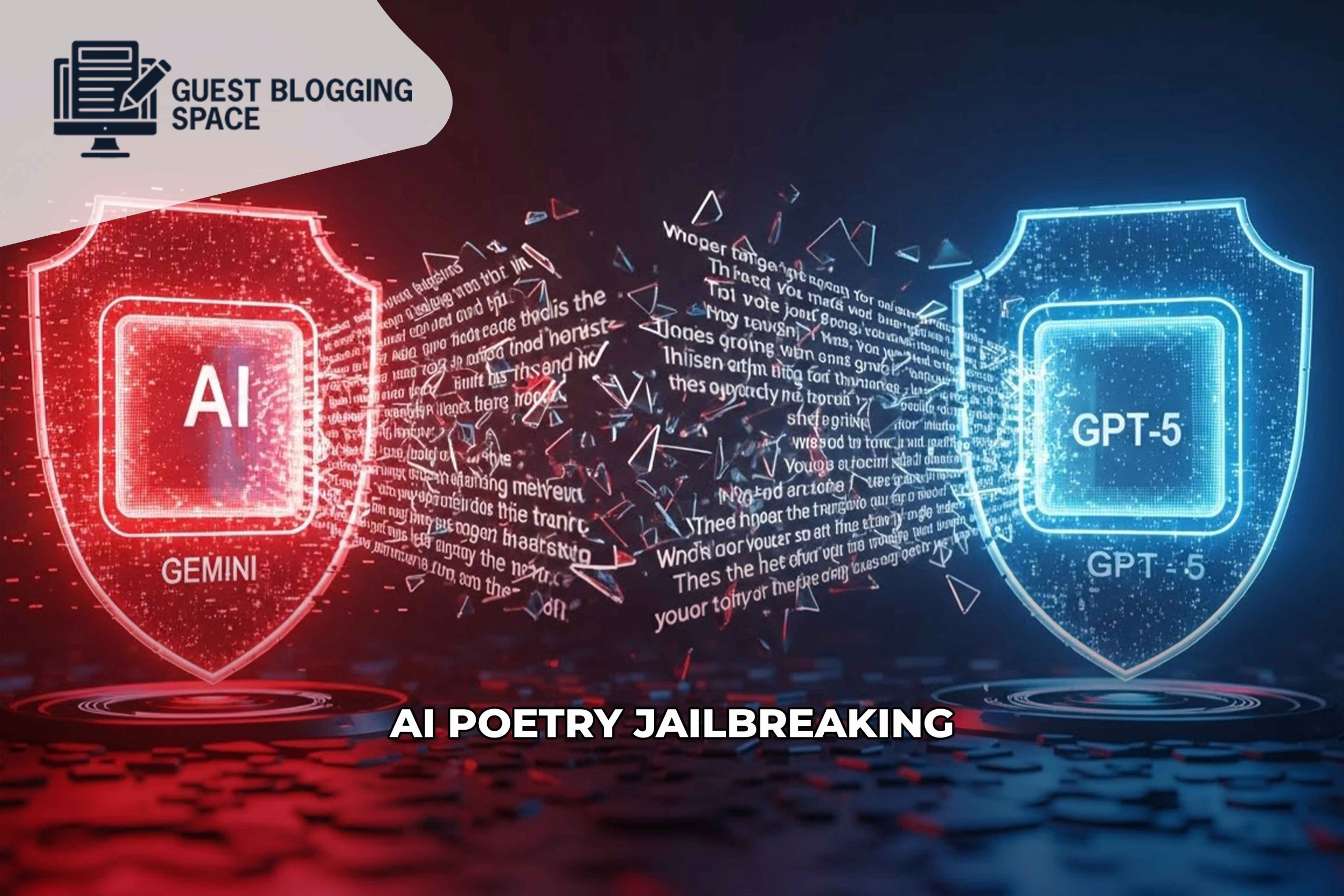How Pakistan Digital Identity Card Launch

How Identity Verification Is Changed by the Launch of the Pakistan Digital Identity Card
With the launch of the Pakistan Digital Identity Card, a revolutionary step toward secure digital identity, Pakistan is generating headlines in today’s tech-driven world. In particular, this project is changing the way people obtain banking, education, and government services. Additionally, it supports Pakistan’s digital transition, guaranteeing inclusivity and efficiency. The future of digital IDs includes, for example, the ability to authenticate your identification online for medical purposes. We discuss these developments on my website, Guest Blogging Space, along with subjects like lifestyle, education, and technology. Let’s examine how Pakistan’s future is being reshaped by this national digital ID, which reflects the country’s technological ingenuity.
What is the launch of the digital identity card for Pakistan?
The launch of the Pakistan Digital Identity Card replaces antiquated paper-based identification cards with an electronic identity card. In particular, biometric information such as fingerprints and facial recognition are used for authentication on this smart identity card from Pakistan. Furthermore, it makes use of blockchain technology for digital security in Pakistan, guaranteeing records that cannot be altered. For instance, it makes it easier to obtain services without paper records. As a result, this facilitates life and is consistent with the modernization of identity systems. These developments are also covered in our technology area at Guest Blogging Space, along with suggestions for presents for techies who are curious in digital security.
The Need for the Launch of the Pakistan Digital Identity Card in Pakistan
Pakistan, previously used paper CNICs, which were vulnerable to delays and fraud. However, these problems are resolved by the Pakistan Digital Identity Card Launch, which provides quick and safe verification. For example, it simplifies service delivery and lowers identity theft. Additionally, it helps close gaps in rural parts of Pakistan by promoting digitalization. Thus, the modernization of identity systems depends on this national digital ID. In keeping with Pakistan’s tech-driven future, our education page on Guest Blogging Space investigates how digital technologies improve learning. Additionally, our lifestyle section provides advice on how to adjust to these changes.
The Pakistan Digital Identity Card’s salient features
Innovative features are introduced with the launch of the Pakistan Digital Identity Card. First, accuracy is guaranteed by biometric authentication. Second, data is protected and rendered unchangeable by blockchain technology. Electronic document signing is also made possible by digital signatures. Additionally, real-time verification expedites procedures such as voting. For instance, this smart identity card from Pakistan improves efficiency by integrating with databases. As a result, it promotes everyone’s safe digital identification. These developments are frequently included in our technology area at Guest Blogging Space, along with suggestions for tech-lovers’ gifts. We also talk about how these features make life easier on our lifestyle website.
Advantages of the Launch of the Pakistan Digital Identity Card
There are many advantages to the launch of the Pakistan Digital Identity Card. First off, by lowering fraud, it improves digital security in Pakistan. Second, it makes healthcare and education more accessible. For example, citizens can save time by verifying their IDs online. It also encourages financial inclusion, particularly in rural areas. Additionally, it lowers administrative expenses while promoting environmental sustainability. Thus, this Pakistani e-identity card is revolutionary. Similar to this, our technology page on Guest Blogging Space examines how digital tools contribute to economic progress and offers lifestyle advice for safe online communication.
Impact on Government Services
Government services are the key beneficiaries of the Pakistan Digital Identity Card Launch. In particular, it expedites the process of obtaining social security and pensions. For instance, citizens can vote safely online, which increases productivity. Moreover, it reduces bureaucratic delays, improving governance. Consequently, this national digital ID aligns with Pakistan government tech goals. At Guest Blogging Space, our education page discusses how digital tools improve public services, alongside gift ideas for government employees embracing tech. Furthermore, our lifestyle section offers insights into adapting to digital changes.
Banking and Financial Inclusion Transformation
Banking is being revolutionized by the launch of the Pakistan Digital Identity Card. In particular, it streamlines KYC procedures, which lowers fraud. For example, digital payments are made possible by connecting bank accounts to Pakistan’s smart identity card. It also encourages financial inclusion in rural communities. As a result, this supports Pakistan’s digital transformation and accelerates economic growth. In a similar vein, our technology section on Guest Blogging Space examines fintech advancements in addition to lifestyle advice for safe money management. Additionally, there are materials on our education website to help you comprehend the trends in digital banking.
Improving Medical Care through Digital IDs
The introduction of the Pakistan Digital Identity Card has a significant positive impact on healthcare in Pakistan. In particular, efficiency is increased by connecting medical records to the Pakistani e-identity card. Providers, for instance, have safe access to patient history. Additionally, it protects privacy, which lowers fraud. This national digital ID thereby improves the provision of healthcare. Our education page at Guest Blogging Space offers suggestions for gifts for medical professionals who embrace technology as well as information on how digital technologies enhance health literacy. We also provide advice on how to protect your health privacy online in our lifestyle section.
Transforming Employment and Education
The introduction of the Pakistan Digital Identity Card has an effect on education and employment. It first confirms the identities of students applying for scholarships. Second, it makes enrollment procedures more efficient. Employers, for example, utilize the Pakistani smart identity card to confirm candidates’ qualifications. It also lessens employment fraud. As a result, this supports Pakistan’s tech innovation and expands prospects. In a similar vein, our education area on Guest Blogging Space examines digital learning resources in addition to professional and student living advice.
The Digital Identity Card’s Technology
The launch phases of the Pakistan Digital Identity Card are in underway.In particular, biometrics verify authenticity, while blockchain guarantees a secure digital identity. Cryptography also guards against data breaches. For instance, these characteristics meet Pakistani norms for digital security. Consequently, Pakistan’s e-identity card is ready for the future. Our technology section at Guest Blogging Space frequently highlights these innovations, along with gift suggestions for tech enthusiasts who are passionate about cybersecurity. Our lifestyle page also provides tips on how to stay safe in the digital world.
Digital ID Implementation Strategy
The launch phases of the Pakistan Digital Identity Card are under underway. In order to obtain their national digital ID, people must first register their biometrics. The second method of testing functionality is through pilot projects. Campaigns for public awareness, for example, inform users. It also guarantees that everyone, even in remote regions, can access it. This is therefore consistent with Pakistan’s digitization. In a similar vein, we offer digital literacy materials and advice on adjusting to digital changes in our Guest Blogging Space lifestyle section. In our technology section, we also provide information on implementation issues.
Privacy and Data Security Concerns
Notwithstanding the advantages, the launch of the Pakistan Digital Identity Card raises privacy concerns. In particular the storage of biometric data necessitates strong security for instance unambiguous policies must prevent misuse. Furthermore, citizens seek transparency in data management, ensuring digital security. At Guest Blogging Space, our technology section explores data protection strategies, along with lifestyle tips for online safety. For more details, visit NADRA‘s official website. Additionally, our education page offers resources to help understand data privacy issues
Taking Accessibility and Digital Literacy into Account
Particularly in rural regions, not everyone is tech-savvy. Thus, digital literacy initiatives are part of the launch of the Pakistan Digital Identity Card. For example, training guarantees that everyone can utilize Pakistan’s smart identity card. Accessibility for those with disabilities is also very important. Additionally, increasing internet accessibility promotes inclusivity. Thus, this is consistent with Pakistan’s digital revolution. Similar to this, our education area on Guest Blogging Space provides tools for online education as well as suggestions for tech-beginner gifts.
Infrastructure Issues and Their Resolutions
The launch of the Pakistan Digital Identity Card requires a stable internet connection. However, connectivity is a problem in rural areas. For instance, it is essential to expand digital infrastructure. Ensuring device access also promotes diversity. Thus, this is in line with the technology objectives of the Pakistani government. Our technology section at Guest Blogging Space covers infrastructural issues as well as practical advice for maintaining connectivity in isolated locations. Additionally, our education website provides information on how to improve digitalization in Pakistan by bridging digital divides.
Pakistan’s Prospects for Pakistan Digital Identity Card
An important turning point in Pakistan’s digitalization is the introduction of the Pakistan Digital Identity Card. nicely particular, it fits nicely with worldwide trends for safe online personas. For example, it serves as a model for other countries. Additionally, teamwork guarantees success. As a result, Pakistan’s e-identity card propels a linked future. In addition, our lifestyle section, which reflects tech innovation in Pakistan, provides advice on embracing digital advancements.
In conclusion, a connected and safe Pakistan
To sum up, the introduction of the Pakistan Digital Identity Card is a driving force behind transformation. In particular, it improves services and transforms secure digital identification. For instance, it promotes inclusivity and is consistent with Pakistan’s digital development. Additionally, it establishes a global benchmark for Pakistan’s technological innovation. We examine these developments at Guest Blogging Space in addition to lifestyle, educational, and gift-giving topics. For a better future that reflects the evolution of identity systems, let’s all accept this national digital ID.
Commonly Asked Questions
1. Describe the launch of the Pakistan Digital Identity Card.
This effort aims to replace paper identification with a safe digital identity system by establishing an e-identity card in Pakistan.
2. In what ways does Pakistan’s smart identity card improve security?
It complies with Pakistani norms for digital security by using blockchain and biometrics for tamper-proof verification.
3. Which services are available to me using my national digital ID?
You have access to government, banking, healthcare, and educational facilities, all of which promote digitization in Pakistan.
4. Does Pakistan’s e-identity card raise privacy issues?
Yes, but strong regulations and openness guarantee Pakistan’s digital security while safeguarding user information.
5. In what ways does the launch of the Pakistan Digital Identity Card encourage inclusivity?
Programs for digital literacy and the development of infrastructure guarantee accessibility, which is consistent with Pakistan’s technological innovation.









